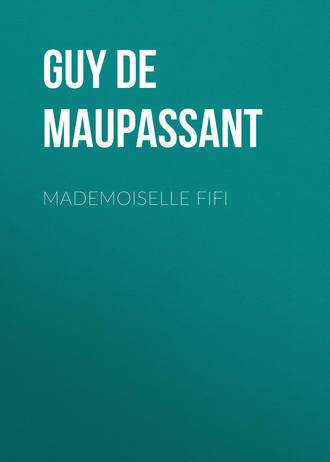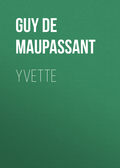
Ги де Мопассан
Mademoiselle Fifi
They dined however as soon as the first furor had abated, but they spoke little.
The ladies retired early; and the men, while smoking, organized a game of écarté and invited Mr. Follenvie to join them, because they wanted to question him skillfully as to the means to be used to overcome the Officer's resistance. but he had his mind concentrated on the cards; he did not hear anything, did not answer anything, and kept on repeating: "Attend to the game, Gentlemen! attend to the game!" – His attention was so tense that he even forgot to expectorate, which produced at times a wheezing in his chest like the sounds of an organ. His whistling lungs gave out every note of the asthmatic scale from the deep and hollow tones up to the shrill crowing of young roosters trying to sing.
He even refused to go up when his wife, overcome with sleep, came to get him. Then she went away all alone, because she was an early riser, getting up with the sun, whereas her husband kept late hours, always ready to spend the night with friends. He called to her: – "Put my eggnog near the fire!" – and continued the game. When the travelers saw that they could not get anything out of him, they announced that it was time to retire, and they all went to bed.
They rose quite early again the next morning with a vague hope, a greater desire to be able to proceed on their journey, and a dread of having to spend another day in this wretched little inn. Alas! the horses remained in the stable, the driver was invisible. Having nothing better to do, they went and wandered around the coach.
Luncheon was very gloomy, and there had developed a general coolness toward Boule de Suif, for night, which brings counsel, had somewhat modified their judgment. They almost bore a grudge against the girl for not having surreptitiously gone to the Prussian Officer to afford a pleasant surprise to her companions when they awoke. Nothing more simple! Beside, who would have suspected it? She might have saved appearances by having the Officer say that he had taken pity on their distress. To her it would have been of little consequence.
But nobody as yet gave expression to such thoughts.
In the afternoon, as they were bored to death, the Count proposed to take a walk around the village. Each one wrapped himself up carefully and the small company set off, with the exception of Cornudet, who preferred to remain by the fire, and the good Nuns who spent their days in Church or at the Parish house.
The cold, growing daily more and more intense, bit mercilessly the nose and ears of the strollers; their feet pained them so much that each step was a torture; and when the country opened up before them, it looked so frightfully dismal under the boundless sheet of white, that they all retraced their steps hastily, with souls frozen and hearts heavy.
The four women walked in front and the three men followed them a little behind.
Loiseau, who understood the situation very clearly, inquired suddenly whether that "wench" was going to keep them much longer in such a place. The Count, always courteous, realized that they could not expect such a painful sacrifice from a woman, and that the offer should originate from her. Monsieur Carré-Lamadon remarked that if the French undertook, as it was rumored, a counter-offensive by way of Dieppe, the battle would certainly be fought in Tôtes. This remark made the other two quite anxious – "How about trying to escape on foot?" suggested Loiseau. The Count shrugged his shoulders: – "That is out of the question in this snow, and with our wives! And furthermore we would be pursued immediately, caught in ten minutes and brought back as prisoners, at the mercy of the soldiers" – That was true. There was silence again.
The ladies talked toilette, but a certain constraint seemed to separate them.
Suddenly the Officer appeared at the end of the street. On the snow that bound the horizon, his tall and wasp-like uniformed figure outlined itself; he walked, knees apart, with that motion particular to soldiers who are anxious not to soil their carefully polished boots.
He bowed as he passed the ladies, and looked scornfully at the men who, it must be said to their credit, had enough dignity not to raise their hats, although Loiseau made a move to take off his headgear.
Boule de Suif blushed red to her ears, and the three married women felt greatly humiliated to have been met by the Officer while they were in the company of this girl whom he had treated so unceremoniously.
Then they spoke of him, of his figure and his face. Madame Carré-Lamadon, who had known many officers and who judged them as a connoisseur, found that this one was not so bad looking after all; she even regretted that he was not French, because he would have made a very handsome husband with whom all the women would have fallen in love.
Once back in the inn, they did not know what to do with themselves. Even acrid words were exchanged about insignificant matters. The silent dinner did not last long and each went upstairs to bed, in the hope of sleeping the time away.
The next morning they came down with tired faces and exasperated tempers. The women hardly spoke to Boule de Suif.
A Church bell began to ring; it was for a baptism. Boule de Suif had a child being brought up by peasants in Yvetot. She did not see it even once a year and never gave it a thought; but the idea of the one that was going to be baptized developed a sudden and violent tenderness for her own and she insisted absolutely on going to the ceremony.
As soon as she was gone, those who remained looked at each other, and drew their chairs closer, for they felt that in the end they had to take some decision. – Loiseau had an inspiration: he suggested that they should propose to the officer to keep Boule de Suif only and let the others go.
Mr. Follenvie undertook again to convey the message, but he came down almost immediately. The German, who knew human nature, had kicked him out of his room. He meant to keep everybody as long as his wishes had not been complied with.
Then the vulgar temper of Madame Loiseau broke loose: – "And yet we are not going to die of old age here! Since it is that vixen's trade to carry it on with all men, I think that she has no right to refuse one rather than another. Imagine, she has taken all that she found in Rouen, even coachmen, yes, Madame, the coachman of the Prefecture; I know it for a fact, because he buys his wine of us. And now that it is a question of getting us out of trouble, she is putting on virtuous airs, the drab! I find that the Officer behaves very well. Possibly he may have abstained for a long time, and here we are three of us whom he certainly would have preferred. But no, he is satisfied with the girl who is public property. He respects married women. Think of it, he is the master here. All that he had to do was to say: 'I want' and he might have taken us by force, with the aid of his soldiers."
The two other women shuddered slightly. The eyes of pretty Madame Carré-Lamadon sparkled, and she grew a little pale as if she felt herself already taken by force by the officer.
The men who were arguing among themselves, came near them. Loiseau, excited, wanted to deliver up that "miserable woman," bound hand and foot, to the enemy. But the Count, descended from three generations of Ambassadors, and endowed with the physique of a diplomat, was advocating more tactfulness and persuasion – "We should persuade her" – said he.
Then they conspired.
The women drew close to each other; the tone of their voices was lowered, and the discussion became general, each giving her opinion. It was most correct, besides. The ladies specially found delicate euphemisms, charming subtleties of expression to say the most shocking things. A stranger would have understood nothing, so well were the precautions of language observed. But as the thin veneer of pudor8, with which every Society woman is provided, covers only the surface, they showed their real selves in this wretched adventure, and were as a matter of fact enjoying themselves immensely, feeling themselves in their element, handling love with the sensuousness of a gourmand cook who prepares supper for somebody else.
Their gaiety came back of itself, so amusing after all did the whole incident seem to them. The Count found rather risky witticisms, but so cleverly told that they provoked smiles. In his turn Loiseau fired some broader jokes, which did not shock the listeners; and the thought brutally expressed by his wife preponderated in every one's mind: "Since it is her business, why should the girl refuse this man rather than another?" – The pretty Mme. Carré-Lamadon seemed even inclined to think that in her place she would refuse this one less than any other.
The blockade was carefully prepared, as if they were besieging a fortress. Each agreed to play the part assigned to him or her, the arguments to be used, the maneuvers to be executed. They decided on the plan of attack, the stratagems and the surprise assault to be attempted in order to compel this living citadel to receive the enemy.
Cornudet, however, remained apart, completely unwilling to participate in this plot.
The minds were so tensely absorbed in this scheme that nobody heard Boule de Suif coming in. But the Count whispered a gentle: "Hush!" which caused all eyes to look up. There she stood. There was a sudden silence and a certain embarrassment prevented them first from speaking to her. The Countess having more than the others the habit of drawing-room duplicities, questioned her: – "Was the baptism interesting? – "
The girl, still laboring under her emotion, told everything, described the faces, the attitudes, and even the appearance of the Church. She added: – "It does one so much good to pray sometimes! – "
However, until lunch time the ladies confined themselves to being nice to her with a view to make her feel more confident and amenable to their advances.
As soon as they sat down to luncheon, the preliminary attack was initiated. It was at first a vague discussion about self-sacrifice. They quoted instances from ancient History, such as Judith and Holophern, then, without any reason Lucretia with Sextus, Cleopatra who admitted to her intimacy all the enemy generals and reduced them to slavish servility. Then a fancy History was propounded, originating in the imagination of those ignorant millionaires, and according to which Roman matrons used to go to Capua and lull Hannibal in their arms, and with him, his lieutenants and the phalanxes of his mercenaries. They quoted all the women who had stopped conquerors, converted their bodies into battlefields, a means of conquest, a weapon, who by their heroic caresses had vanquished frightful and execrated beings, and had sacrificed their chastity to vengeance and patriotic devotion.
They even spoke, in veiled terms, of that English lady of noble family, who had allowed herself to be inoculated with a horrid and contagious disease, which she wanted to communicate to Bonaparte, and how the latter had been miraculously saved by a sudden faintness during the fatal appointment.
And all this was told without overstepping the bounds of propriety and moderation, with her and there a studied manifestation of enthusiasm intended to provoke emulation.
In the end one would have been led to believe that the only mission of woman on this earth was a perpetual sacrifice of her person, a continual offering of herself to the caprices of enemy soldiers.
The two nuns did not seem to hear this conversation, lost as they were in their own deep thoughts. Boule de Suif was silent.
The whole afternoon she was left to herself. But instead of calling her "Madame" as they had done so far, they addressed her as mademoiselle, nobody knew why, as if they wanted to lower her one step in their esteem, which she had escaladed, and make her feel her shameful situation.
While soup was being served, Mr. Follenvie reappeared and repeated his sentence of the day before: – "The Prussian Officer sends me to inquire whether Mademoiselle Elizabeth Rousset has not yet changed her mind?"
Boule de Suif replied curtly: "No, Sir."
But at dinner the coalition weakened. Loiseau spoke three unfortunate sentences. Each was racking his brains to find new examples and did not find any, when the Countess, possibly without premeditation, prompted by a vague desire to render homage to religion, questioned the elder of the two nuns about the most noteworthy deeds in the lives of the Saints. – Now, many Saints had committed acts which would be crimes in our estimation; but the Church absolves readily such transgressions when they are committed for the glory of God and the love of our neighbors. This was a powerful argument; the Countess made the most of it. Then, either by one of those tacit understandings, those veiled complaisances in which whoever wears the clerical garb excels, or through fortunate stupidity, serviable foolishness, the old nun brought a formidable support to the conspiracy. They thought she was timid; she showed herself bold, talkative, violent. This one was not trouble by the hesitations of casuistry; her doctrine seemed to be an iron bar; her faith never hesitated; her conscience had no scruples. She found quite natural Abraham's sacrifice, because she would immediately have killed her father and mother if she had received an order from heaven to do so; and in her opinion nothing could displease God if the motive were laudable. The Countess taking advantage of the sacred authority of her unexpected accomplice, led her on to make a kind of edifying paraphrase of this axiom of morality: "The end justifies the means."
She questioned her:
– "Then, Sister, you think that God accepts all methods and forgives the act when the motive is pure?"
– "Who could doubt it, Madame? An action condemnable in itself often becomes meritorious by the thought which inspires it."
And they continued in this way, unraveling God's intentions, forecasting his judgments, and making Him take interest in things that really did not concern Him at all.
All this was expounded in a veiled, clever, discreet and insinuating manner. But each word of the holy woman in cornet made a breach in the indignant resistance of the courtesan. Then the conversation drifting somewhat, the woman with the hanging rosary spoke of the Convents of her Order, of her Superior, of herself, and of her lovely neighbor, the dear Sister Saint-Nicephore. They had been called to Havre to nurse in the Hospitals hundreds of soldiers stricken with small-pox. She described them, those wretched victims, and gave details about their disease. And while they had been stopped on their way by the caprices of this Prussian Officer, a large number of Frenchmen, whom they would probably have saved, might die. It was her specialty to nurse soldiers; she had been in Crimea, in Italy, in Austria, and telling the story of her campaigns, she unexpectedly revealed herself one of those Nuns fond of drums and bugles, who seem to have been created to follow the armies in action, to pick soldiers during the vicissitudes of battles, and, better than a General, to tame with one word the rough and insubordinate troopers; a genuine martial and bellicose Nun, whose wrinkled and pitted face, looked like an image of the devastations of war.
No one uttered a word after she had concluded, so excellent seemed to be the effect of her discourse.
As soon as the meal was over, they went up quickly to their rooms and came down the next morning rather late.
Luncheon went off quietly. They were giving the seed that had been sown time to germinate and come to fruition.
The Countess proposed to take a walk in the afternoon; then the Count, as previously agreed, offered his arm to Boule de Suif and walked with her at some distance behind.
He spoke to her in that familiar, paternal and slightly contemptuous tone which sedate men assume when talking with women of loose morals, calling her: "my dear child," treating her from the height of his social position, his unquestionable honesty. He went straight to the core of the matter:
– "So you prefer to leave us here exposed like yourself to all the violence which would result from a defeat of the Prussian Army, rather than consent to one of those complaisances which you have had so often in your life" —
Boule de Suif did not answer.
He tried kindness, reasoning, sentiment. He managed to remain "Monsieur le Comte" even while showing himself gallant, when necessary, flattering, amiable. He praised to exaltation the services she would render them, spoke of their gratitude, then suddenly, using the familiar "thou," gaily: "And thou knowest, my dear, he might be proud of having tasted the charms of a pretty girl such as he won't find often in his own country."
Boule de Suif did not reply and joined the rest of the party.
As soon as they returned to the inn, she went up to her room and was not seen again. There was extreme anxiety. What was she going to do? If she resisted, what an embarrassment for them all?
The dinner hour struck; they waited for her in vain. Then Mr. Follenvie came in and announced that Mademoiselle Rousset did not feel well and that they might sit down to dinner. They all pricked their ears. The Count came near the inn-keeper and whispered: "Is it all right?" – "Yes."
For the sake of propriety, he did not say anything to his companions, but nodded to them slightly. Immediately a great sigh of relief went up from all breasts; joy brightened every face. Loiseau exclaimed: "By Jove, I'll treat to champagne if any is left in this house!" – And Madame Loiseau felt a pang when the inn-keeper returned with four bottles in his hand. Every one had suddenly become communicative and merry; a lively joy filled the hearts. The Count seemed to notice that Madame Carré-Lamadon was charming; the manufacturer paid compliments to the Countess; the conversation was lively, gay and full of witticisms.
Suddenly Loiseau, with an alarmed face, raised his arms and shouted: "Silence!" They all stopped talking, were surprised nay even frightened. Then he listened, said "Hush!" signaling with his two hands, raised his eyes to the ceiling, listened again and, in his natural voice, he resumed: "Don't be afraid, everything is all right!"
They hesitated to understand what he meant, but soon a smile lighted up all the faces.
After a quarter of an hour, he started again the same farce and repeated it often during the evening; he mimicked as if he were calling a person on the second floor and giving her equivocal advices drawn from his imagination of a commercial traveler. At times he assumed a dismal air and sighed: – "Poor girl!" – or he muttered in his teeth, with a peevish air: – "Rascal of a Prussian!" – Several times, when the others did not think of it, he called out repeatedly in a vibrating voice: "Enough! Enough!" and he added as if soliloquizing: – "Provided that we see her again and that the wretch does not kill her!"
Although such jokes were in very bad taste, they amused more than they shocked the company, for indignation like everything else depends on environment, and the atmosphere that had gradually developed around them was laden with naughty thoughts.
At dessert, even the women indulged in witty and discreet allusions. Their eyes were bright and gleaming; they had drunk considerably. The Count who, even in his moments of relaxation, preserved a dignified appearance, found a comparison with the end of winter in the polar regions and the joy of the ship-wrecked mariners when they see a way open to the South; and this comparison was greatly appreciated.
Loiseau, warmed up, rose to his feet with a glass of champagne in his hands: – "I drink to our deliverance!" – Everybody stood up; he was acclaimed. Even the two good sisters, urged by the ladies, consented to moisten their lips with the sparkling wine, which they had never tasted. They declared that it tasted like sparkling lemonade, but that it was finer.
Loiseau summed up the situation:
– "What a pity that there is no piano! We might have danced a quadrille!" —
Cornudet had not said a single word, nor made a single gesture; he even seemed to be plunged in very serious thoughts, and from time to time tugged furiously at his long beard as if he wanted to make it longer. Finally, toward midnight, as they were going to separate, Loiseau, who was unsteady on his feet slapped him suddenly on the stomach and spluttered: – "You are not in a gay mood to-night, you don't talk much, citoyen?" – But Cornudet raised briskly his head and casting a swift and terrible look at the company, fairly shouted: – "I tell you all, that you have behaved infamously!" – He got up, walked to the door and repeated once more: "Infamous!" and he disappeared.
This threw a chill at first. Loiseau nonplused, stood looking foolish; but he recovered his countenance and then suddenly began to laugh and repeat: – "Sour grapes! my dear Sir, sour grapes!" – The company did not understand what he meant; he explained the "mysteries of the hall" – Then there was a resumption of formidable gayety. The ladies were immensely amused. The Count and Mr. Carré-Lamadon laughed to tears. They could hardly believe their ears.







